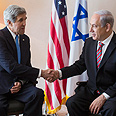
I have had almost three wonderful years in Israel, but my most vivid memory is not a happy one. It is of a children’s bedroom in Kiryat Malachi, which I visited last November during Operation Pillar of Defense, just a few hours after it had been hit by a rocket. Three adults were killed. Two children were seriously injured. There was blood on the child's bed. There was a baby’s cot next to it. That image will stay with me until the day I die.
When I talk about Israel's need for security, I know what that requirement means to Israelis. Diplomats can sometimes talk about security as though it were a subject for seminars and policy papers. But for a country that has been repeatedly bombarded with rockets, and subjected to waves of vicious terrorist attacks, security is not something that can be discussed in the abstract.
With all these threats, we understand why Israelis are nervous about making peace with the Palestinians. Israel has legitimate security concerns about the creation of a Palestinian state. After the experience of leaving Gaza, it is hardly surprising there are concerns that if Israeli forces left the West Bank it might create a safe haven for terrorism and rocket attacks.
Any peace deal will have to address those concerns. Israel must have confidence that when it ends the occupation it will find a peaceful neighbor. It needs to know that a peace deal with the Palestinians will make it more secure, not less.
Many have said that with all the turmoil in the region, this is the worst possible moment for Israel to try to make peace. How can Israel know that if it signs a deal with the Palestinians today, someone else will not take over tomorrow?
Better future for Israel’s children
The honest answer is that there is no guarantee of the future. But I am confident of three points: First, that if Israel is waiting for a solution guaranteed to last forever, there will never be a peace deal. There would have been no peace deal with Egypt, for example, if there had been a requirement that it hold for eternity. After 35 years of peace with Egypt, does anyone really believe that Israel would have been more secure if that peace deal had not been signed?
Second, that if Israel waits for a solution that offers a perfect security, then there will be no peace deal. There is no such thing as perfect security, or any solution that offers absolute guarantees. There are just solutions that offer different degrees and types of risk.
Third, the status quo in the West Bank will not hold without a deal, and the situation will deteriorate. The hopes of the Arab Spring resonate in the Palestinian territories too. It might not be immediate, or fast, but if all hope is lost that a peace deal is possible, the impact on Israel’s security will be grave.
Making peace with the Palestinians will be a fantastically difficult task. Everyone involved will need to work hard and imaginatively to find answers to Israel’s security concerns, but using those security concerns to rule out even the possibility of making peace, before we have even started, will undermine Israel’s long-term security rather than preserve it.
Britain understands and respects Israel’s security concerns. We are neither naïve about the region nor blind to the risks. We believe that Israel’s security can best be preserved for the long-term by the creation of a Palestinian state to exist alongside Israel.
This is why the UK is giving its full support to Secretary Kerry’s leadership on this issue; and why Britain will stand with Israel on the difficult road to peace. Because the cot in the children’s room in the Kiryat Malachi apartment was the same cot that I put my daughter to bed in every night, and I want a better future for Israel’s children.
Matthew Gould is the British ambassador to Israel















